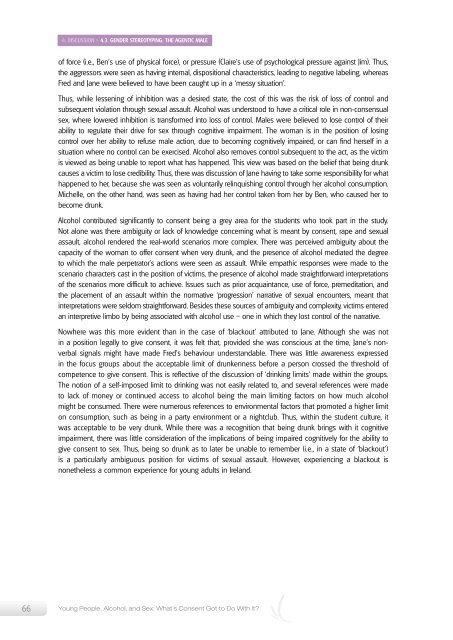Whats-Consent-Full-A41
Whats-Consent-Full-A41
Whats-Consent-Full-A41
You also want an ePaper? Increase the reach of your titles
YUMPU automatically turns print PDFs into web optimized ePapers that Google loves.
4. Discussion > 4.3. Gender Stereotyping: The Agentic Maleof force (i.e., Ben’s use of physical force), or pressure (Claire’s use of psychological pressure against Jim). Thus,the aggressors were seen as having internal, dispositional characteristics, leading to negative labeling, whereasFred and Jane were believed to have been caught up in a ‘messy situation’.Thus, while lessening of inhibition was a desired state, the cost of this was the risk of loss of control andsubsequent violation through sexual assault. Alcohol was understood to have a critical role in non-consensualsex, where lowered inhibition is transformed into loss of control. Males were believed to lose control of theirability to regulate their drive for sex through cognitive impairment. The woman is in the position of losingcontrol over her ability to refuse male action, due to becoming cognitively impaired, or can find herself in asituation where no control can be exercised. Alcohol also removes control subsequent to the act, as the victimis viewed as being unable to report what has happened. This view was based on the belief that being drunkcauses a victim to lose credibility. Thus, there was discussion of Jane having to take some responsibility for whathappened to her, because she was seen as voluntarily relinquishing control through her alcohol consumption.Michelle, on the other hand, was seen as having had her control taken from her by Ben, who caused her tobecome drunk.Alcohol contributed significantly to consent being a grey area for the students who took part in the study.Not alone was there ambiguity or lack of knowledge concerning what is meant by consent, rape and sexualassault, alcohol rendered the real-world scenarios more complex. There was perceived ambiguity about thecapacity of the woman to offer consent when very drunk, and the presence of alcohol mediated the degreeto which the male perpetrator’s actions were seen as assault. While empathic responses were made to thescenario characters cast in the position of victims, the presence of alcohol made straightforward interpretationsof the scenarios more difficult to achieve. Issues such as prior acquaintance, use of force, premeditation, andthe placement of an assault within the normative ‘progression’ narrative of sexual encounters, meant thatinterpretations were seldom straightforward. Besides these sources of ambiguity and complexity, victims enteredan interpretive limbo by being associated with alcohol use – one in which they lost control of the narrative.Nowhere was this more evident than in the case of ‘blackout’ attributed to Jane. Although she was notin a position legally to give consent, it was felt that, provided she was conscious at the time, Jane’s nonverbalsignals might have made Fred’s behaviour understandable. There was little awareness expressedin the focus groups about the acceptable limit of drunkenness before a person crossed the threshold ofcompetence to give consent. This is reflective of the discussion of ‘drinking limits’ made within the groups.The notion of a self-imposed limit to drinking was not easily related to, and several references were madeto lack of money or continued access to alcohol being the main limiting factors on how much alcoholmight be consumed. There were numerous references to environmental factors that promoted a higher limiton consumption, such as being in a party environment or a nightclub. Thus, within the student culture, itwas acceptable to be very drunk. While there was a recognition that being drunk brings with it cognitiveimpairment, there was little consideration of the implications of being impaired cognitively for the ability togive consent to sex. Thus, being so drunk as to later be unable to remember (i.e., in a state of ‘blackout’)is a particularly ambiguous position for victims of sexual assault. However, experiencing a blackout isnonetheless a common experience for young adults in Ireland.66 Young People, Alcohol, and Sex: What’s <strong>Consent</strong> Got to Do With It?


